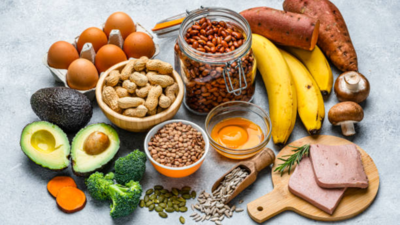ARTICLE AD BOX

Magnesium-rich foods are essential for muscle function, heart health, and bone strength. Leafy greens like spinach, kale, and Swiss chard are top sources. Nuts and seeds, especially almonds, cashews, pumpkin, and sunflower seeds, offer a magnesium boost. Whole grains like brown rice, quinoa, and oats also help meet your daily needs. Legumes such as black beans, lentils, and chickpeas are excellent plant-based sources. Dark chocolate, avocado, tofu, and bananas provide smaller but significant amounts. Including these foods regularly in your diet can support energy production, reduce muscle cramps, and improve sleep quality naturally. Aim for variety for optimal intake.
Do you always feel tired, dizzy and drained? Then your low-energy levels are indicating low vitamin b levels. Our body needs ample nutrients to carry out the basic functioning of the body, and one such nutrient is vitamin b, which is one of the most underrated nutrients that can affect overall health and well being.
Here’s all you need to know about Vitamin B, and why it is so important and foods to include in the diet to boost vitamin b levels naturally.What exactly is vitamin B?Vitamin B is basically a group of eight essential nutrients that are vital for the body’s overall functioning. These are water-soluble vitamins collectively called the B-complex vitamins, and each plays a unique role in energy production, cell metabolism, and nervous system health.
The B-complex includes B1 (thiamine), B2 (riboflavin), B3 (niacin), B5 (pantothenic acid), B6 (pyridoxine), B7 (biotin), B9 (folate), and B12 (cobalamin).
Since our body doesn't store most of these vitamins, daily intake through diet is crucial.

Certain foods can naturally support kidney health and keep them functioning smoothly. Berries like blueberries and cranberries are rich in antioxidants that protect kidney cells from damage. Leafy greens like kale and spinach (in moderation) offer vital nutrients without overloading sodium. Cauliflower, garlic, and onions are anti-inflammatory and kidney-friendly. Apples and grapes are great low-potassium fruits. Fatty fish like salmon provides omega-3s that reduce inflammation. Water is, of course, essential for flushing toxins. Remember to choose foods low in sodium, phosphorus, and potassium if you have existing kidney issues. Always check with your doctor or dietitian before making major dietary changes.
What makes Vitamin B so important?Vitamin B plays a major role in converting the food we eat into energy. It helps form red blood cells, supports brain function, and maintains healthy skin and hair.
B12 and folate are especially critical for DNA synthesis and neurological health, while B6 helps regulate mood and sleep by aiding neurotransmitter production. A deficiency in B vitamins can lead to fatigue, anemia, mood disorders, and even nerve damage over time.Whole Grains and CerealsWhole grains such as brown rice, oats, millet, and wheat are excellent sources of B1, B3, and B5. Fortified breakfast cereals often contain nearly all B vitamins, especially B12 for vegetarians.
Including these in your daily meals can help maintain energy and brain function.

I present a vibrant spread of dairy, leafy greens, almonds, salmon, and oranges, all rich in nutrients essential for bone health.
Legumes and PulsesLentils, beans, and chickpeas are rich in B9 (folate) and B1. Folate is particularly important for pregnant women to prevent neural tube defects in the baby. A bowl of cooked lentils can meet up to 90% of the daily folate requirement.Animal-Based FoodsEggs, dairy, chicken, fish, and meat are among the best sources of B12, which is not naturally found in plant foods.
Vitamin B12 supports nerve health and helps make red blood cells. Non-vegetarians usually get enough B12, but vegetarians may need to rely on fortified foods or supplements.Nuts and SeedsSunflower seeds, flaxseeds, and almonds are good sources of B6, B3, and biotin (B7). These help maintain healthy skin, hair, and nails. A handful of mixed seeds and nuts can provide a daily boost of energy and nourishment.

The first meal of the day should support not just energy levels but also brain function. Including foods like soaked almonds, walnuts, chia seeds, or a boiled egg provides essential omega-3 fats and antioxidants. A bowl of seasonal fruits or oats adds natural fibre and vitamins that enhance digestion and mood. Nutritionists often link brain-healthy breakfasts with better concentration, mood stability, and reduced cravings later in the day.
Leafy Greens and VegetablesSpinach, broccoli, and asparagus are rich in folate (B9) and other B vitamins.
These vegetables support cellular repair, immunity, and detoxification. Cooking them lightly helps preserve their vitamin content.Can’t eat your food without snapping a picture first?Join our Food Photography Contest and stand a chance to win exciting prizes!Click HERE for details.Join our WhatsApp Food Community to discover delicious recipes, enjoy fascinating food stories, and stay updated with the latest food news! Click here



.png)
.png)
.png)
















 2 days ago
5
2 days ago
5









 English (US) ·
English (US) ·